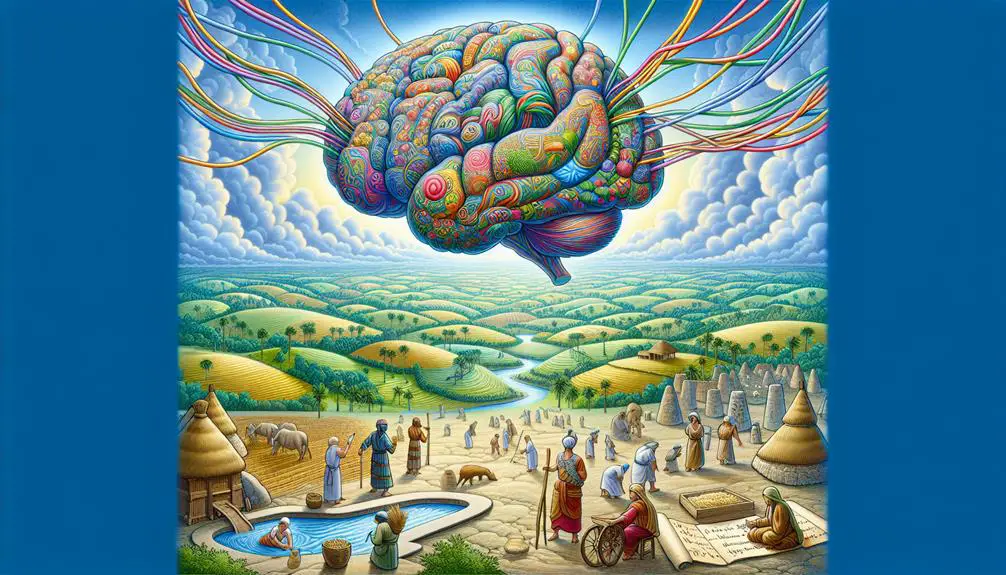Discover how biblical characters might reflect ADHD traits, offering a unique perspective on neurodiversity in ancient texts.

Adhd in the Bible
As you wander through the winding words of the Bible, you might wonder whether any characters displayed traits akin to ADHD. It's a thought-provoking question, given that the condition, as we understand it today, wasn't diagnosed in ancient times.
Yet, by examining behaviors and personalities, you could uncover fascinating insights into how impulsivity and hyperfocus might have manifested in biblical times. This exploration isn't just about historical curiosity; it's about deepening our understanding of diversity and acceptance throughout ages.
So, why not embark on this journey to see what revelations lie in scripture, waiting to offer a fresh perspective on ADHD?
Key Takeaways
- Biblical characters display traits resonant with ADHD, suggesting historical presence and acceptance of neurodiversity.
- Scripture narratives offer supportive perspectives on mental diversity, emphasizing individual value and contribution.
- The evolution of societal views on impulsivity and focus reflects a shift from stigma to understanding and inclusivity.
- Biblical examples, like Moses and David, advocate for accommodating and empowering diverse minds, highlighting the importance of empathy and compassion.
Understanding ADHD: A Modern Perspective

In examining ADHD from a modern perspective, it's essential to recognize that this condition, characterized by patterns of inattention, impulsivity, and hyperactivity, isn't just a behavioral issue but a complex neurological disorder. It's a manifestation of brain function diversity that challenges traditional views on mental health and cognition. The journey towards neurodiversity acceptance has been pivotal in reshaping how society views ADHD and other neurodevelopmental conditions. This shift acknowledges the unique contributions and perspectives of individuals with ADHD, promoting a more inclusive and understanding environment.
Diagnostic evolution plays a crucial role in this modern understanding of ADHD. Historically, behaviors associated with ADHD were often misunderstood, leading to stigmatization and inadequate support. However, advances in neuroscience and psychology have led to more precise diagnostic criteria and a better understanding of the condition's biological underpinnings. This evolution in diagnosis hasn't only improved the accuracy of identifying ADHD but also fostered a broader recognition of its complexity and variability among individuals.
As you delve deeper into this topic, it's vital to appreciate the interdisciplinary efforts that have contributed to our current understanding of ADHD. From genetic research to studies on environmental factors, a multifaceted approach has been essential in unraveling the intricacies of this condition. This comprehensive perspective underscores the importance of continued research and dialogue in advancing ADHD awareness and treatment, ensuring that individuals with ADHD receive the support and recognition they deserve.
Biblical Characters With ADHD Traits

Examining the Bible reveals several characters whose behaviors and challenges mirror traits commonly associated with ADHD, offering a unique lens through which to view this condition's historical presence. These narratives spotlight Hyperactive Prophets and Scriptural Distractions, suggesting an early recognition of attention-deficit traits.
Consider the tale of Elijah, a prophet whose life was a whirlwind of activity, often moving rapidly from one mission to another. Elijah's journey, marked by extreme highs and lows, reflects a hyperactive temperament, one that struggles to find peace and rest. His experiences, filled with fervent actions and passionate declarations, echo the impulsivity and emotional dysregulation characteristic of ADHD.
Similarly, the story of Martha in the New Testament provides insight into Scriptural Distractions. While hosting Jesus, Martha becomes overly concerned with the preparations, to the extent that she's distracted from the more important matter of listening to her guest. This account illustrates a common struggle with prioritizing tasks and managing distractions, a hallmark challenge for those with ADHD.
These examples, among others, don't diagnose historical figures posthumously but rather highlight behaviors and traits within the biblical narrative that resonate with contemporary understandings of ADHD. This approach encourages a deeper empathy and a broader perspective on how individuals with ADHD have always been part of the fabric of human history, navigating their unique challenges and contributing to societal narratives in meaningful ways.
Societal Views on Impulsivity and Focus

Reflecting on biblical characters who exhibit ADHD-like traits offers a profound understanding of how impulsivity and focus challenges have been perceived and managed throughout history. The narratives surrounding these individuals shed light on the broader societal views that have shaped our current attitudes towards such behaviors.
- Cultural Stigma: Historically, behaviors associated with impulsivity and lack of focus were often misunderstood, leading to social ostracization. This stigma, deeply rooted in cultural beliefs, has evolved, but remnants still influence how ADHD is viewed today. Individuals exhibiting these traits were frequently seen as disruptors of peace, rather than as people facing genuine challenges.
- Historical Interpretations: The interpretation of these behaviors has shifted significantly over time. Initially, traits of impulsivity and inattention might've been perceived as signs of divine inspiration or possession, depending on the cultural and religious context. This duality highlights the complex relationship between societal norms and individual behaviors.
- Recognition and Misunderstanding: While some historical figures were celebrated for their dynamic energy and creativity, others faced severe consequences due to misunderstanding of their actions. This dichotomy underscores the importance of context in evaluating behavior.
- Shifts in Perception: Over centuries, the perception of impulsivity and focus challenges has transformed from moral failings to recognized medical conditions. This transition reflects a broader societal shift towards understanding and accommodating diverse neurological experiences.
In examining these points, it's evident that cultural stigma and historical interpretations have played significant roles in shaping the societal views on impulsivity and focus. Understanding this evolution is crucial in fostering a more inclusive and empathetic society.
Supporting Diverse Minds in Scripture
Scripture offers a rich tapestry of narratives that, upon closer examination, reveal an inclusive approach to understanding and supporting diverse mental processes. This perspective enriches Scriptural interpretations, highlighting a foundation for neurodiversity acceptance that predates modern terminology.
The Bible doesn't explicitly mention ADHD or neurodiversity, yet its narratives and teachings can be interpreted to support the inclusion and acceptance of different cognitive styles. Consider the parables and stories that emphasize the value of each individual, regardless of their abilities or behaviors. This can be seen as an encouragement of neurodiversity acceptance, validating the significance of every person's unique contribution to the community.
To illustrate, let's engage with a table that highlights key aspects of supporting diverse minds in Scripture:
Aspect |
Example |
Interpretation |
|---|---|---|
Inclusion |
Parable of the Lost Sheep (Luke 15:4-7) |
Valuing each individual, akin to understanding the importance of supporting diverse cognitive styles. |
Understanding |
Moses' Speech Impediment (Exodus 4:10-12) |
God's accommodation of Moses' difficulty, suggesting a model for supporting those with communication differences. |
Empowerment |
David's Unique Skills (1 Samuel 17) |
David's unconventional approach to facing Goliath underscores the value of individual strengths, mirroring the empowerment of neurodiverse minds. |
This analytical exploration into Scriptural narratives demonstrates a scholarly approach to understanding how these ancient texts can inform and enrich our contemporary appreciation for neurodiversity acceptance. By examining these examples, one can appreciate the Bible's nuanced approach to embracing and supporting diverse mental processes.
Insights and Reflections on Spirituality

Building on the understanding of neurodiversity acceptance in biblical narratives, let's explore how these insights enrich our spiritual journey and reflection. Recognizing the diversity of minds and experiences depicted in scripture offers a profound opportunity for you to deepen your spiritual mindfulness and navigate faith challenges with grace and insight.
- Acknowledgment of Individuality: You're reminded that spiritual experiences and expressions of faith are as diverse as humanity itself. This acknowledgment encourages you to find your unique path to spiritual mindfulness, embracing your personal journey without comparison or judgment.
- Empathy and Compassion: Learning about neurodiversity in biblical contexts fosters empathy and compassion, not just for others, but also for yourself. This can be particularly empowering when you're facing faith challenges, reminding you that struggles are part of the human experience and spiritual growth.
- Inclusivity in Spiritual Communities: These insights inspire you to advocate for more inclusive and supportive faith communities. Understanding that everyone's path to spiritual mindfulness is unique, you're encouraged to create spaces where all can explore and express their spirituality without fear of judgment.
- Resilience in Faith Challenges: Reflecting on the neurodiversity depicted in scripture, you're equipped with examples of resilience and perseverance. This historical and spiritual context offers you a blueprint for navigating your own faith challenges with strength and determination.
Frequently Asked Questions
How Do Religious Scholars Reconcile the Absence of a Direct Mention of ADHD in the Bible With the Modern Diagnosis and Understanding of the Condition?
You're exploring how scholars tackle the lack of mention of ADHD in ancient texts.
They delve into historical context and cultural perceptions, understanding that diagnostic terms and mental health awareness have evolved.
By analyzing behaviors and descriptions from the past through a modern lens, they bridge the gap between ancient understandings and today's diagnoses.
This insightful approach reveals how cultural shifts and scientific progress influence our interpretation of historical texts.
Are There Any Specific Prayers, Psalms, or Scriptures Recommended for Individuals or Families Dealing With ADHD to Find Solace or Guidance?
When seeking solace or guidance for ADHD, you'll find no direct references in scripture. However, delving into historical context and meditation practices can offer insight.
Scriptures like Philippians 4:6-7, emphasizing peace and prayer, resonate deeply. Similarly, Psalms 46:10, advocating stillness, provides a reflective space for managing ADHD's challenges.
These passages, while not specific, offer a framework for understanding and patience, aligning with scholarly interpretations of spiritual support.
Can the Concept of Divine Healing in the Bible Be Applied to ADHD, and How Do Religious Communities View Medical Interventions Versus Spiritual Healing for Such Conditions?
You're exploring if divine intervention can address ADHD and how faith communities perceive medical versus spiritual healing. It's complex; while some embrace divine healing, others show spiritual skepticism towards forsaking medical treatments.
Your inquiry delves deep, questioning the balance between faith and science. It's insightful, revealing a nuanced understanding of both the power of prayer and the value of medical interventions in managing conditions traditionally seen through a spiritual lens.
How Do Different Translations of the Bible Potentially Influence the Interpretation of Characters or Behaviors That Might Be Seen as Indicative of ADHD Traits?
You're diving into how different Bible translations can alter the perception of characters with ADHD-like traits. Translation accuracy is crucial here; even slight variations can shift understanding dramatically.
Cultural interpretations also play a significant role, as what's seen as indicative of ADHD in one context mightn't be in another.
Analyzing these texts, you're uncovering layers of meaning and seeing how modern perspectives can enlighten ancient narratives.
What Role Do Faith Leaders or Religious Educators Suggest for Integrating Modern Psychological Understanding, Such as ADHD, Into Religious Teachings and Community Support Mechanisms?
You're exploring how faith leaders advocate integrating modern psychology, like ADHD, into religious teachings. They see value in cultural adaptation and evolving spiritual practices to include contemporary understanding.
This approach enriches community support, making it more inclusive and understanding of diverse mental health needs. By weaving psychological insights into religious frameworks, they're not just staying relevant; they're fostering a more compassionate, adaptive community that can truly support all members.
Conclusion
In conclusion, exploring ADHD through the lens of biblical narratives offers a profound reflection on humanity's diverse cognitive landscapes. Characters like Moses or Paul, potentially embodying ADHD traits, remind us that impulsivity and hyper-focus have always been part of the human condition.
This anachronistic interpretation not only humanizes scriptural figures but also encourages a more compassionate, understanding approach to neurodiversity. By acknowledging these timeless experiences, we deepen our spiritual and scholarly insights, fostering a more inclusive society.



Sign up